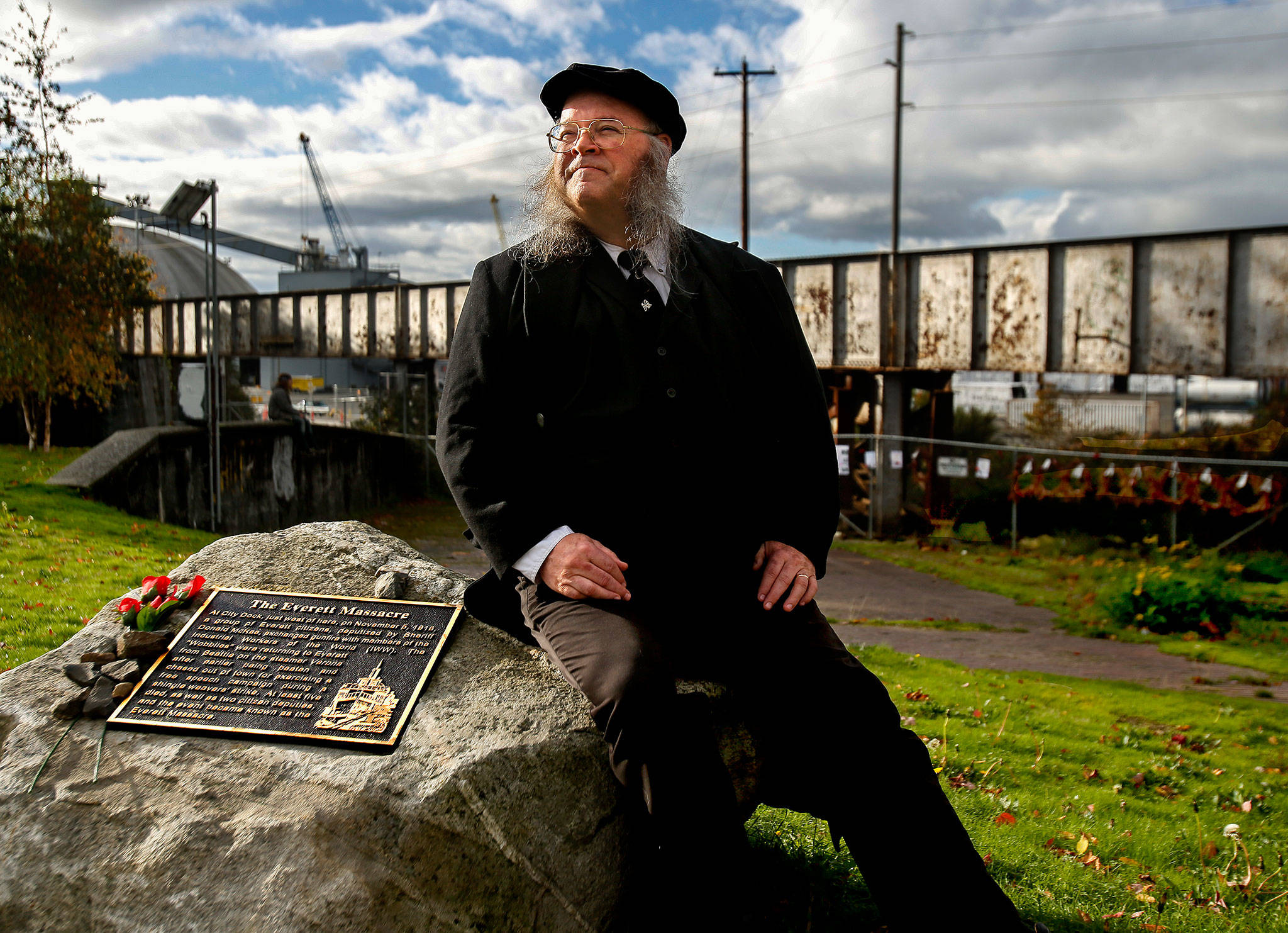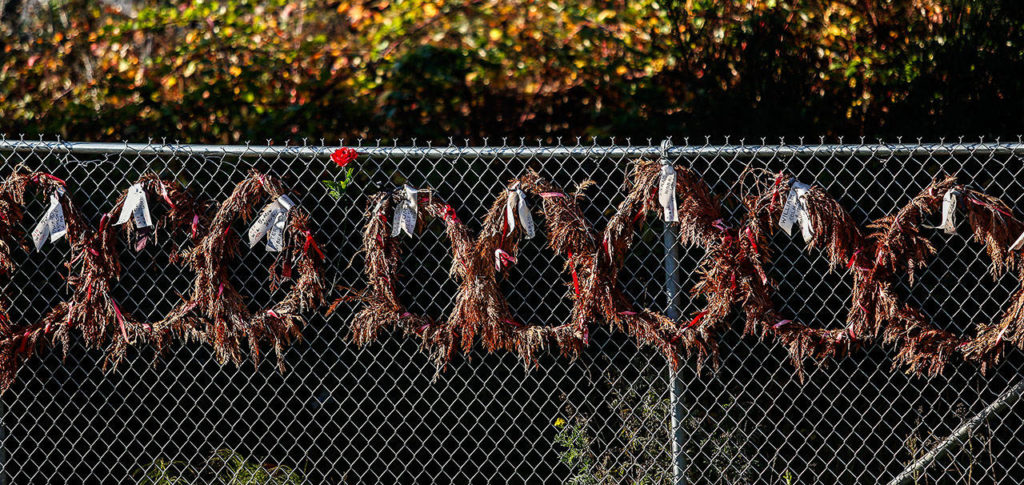Wilted, brown, but not forgotten — not by those passionate about the past — the wreaths hang on a fence near the plaque commemorating the Everett Massacre.
A brief story of what happened Nov. 5, 1916, is told in bronze on the marker at the junction of Bond Street, Hewitt and Federal avenues.
On Sunday, the eve of the 102nd anniversary of Everett’s waterfront gun battle, Christopher Summit gave a talk titled “A Problem With Sources.” The program was at the Anchor Pub, near where gunfire erupted on what became known as Everett’s Bloody Sunday.
A history buff, Summit, 57, has been involved with the Mukilteo Historical Society as an officer and board member. He is a Boeing Tour visitor guide. A 1979 Mariner High School graduate, from 1981 to 1985 he worked for the National Park Service as a seasonal ranger at the Little Bighorn Battlefield National Monument.
Summit doesn’t dispute the words on the Everett Massacre marker, written by Everett historian Jack O’Donnell. Installed in 2016, the plaque offers this concise history lesson:
“At City Dock, just west of here, on November 5, 1916, a group of Everett citizens, deputized by Sheriff Donald McRae, exchanged gunfire with members of the Industrial Workers of the World (IWW). The “Wobblies” were returning to Everett from Seattle on the steamer Verona after earlier being beaten and chased out of town for exercising a free speech campaign during a shingle weavers’ strike. At least five died, as well as two citizen deputies, and the event became known as the Everett Massacre.”
In 2016, the event’s centennial, O’Donnell told Herald writer Eric Stevick how he worked to describe that day in a factual manner. “I always hesitate to make one side or the other guilty,” O’Donnell said at the time. “It’s a shade of gray. I just tried to say what happened.”
The headline on that 2016 Herald story was “100 years after Everett Massacre we’re still learning more.” Two years later, Summit’s talk was about how there’s more to learn still — due to the growth of digital sources.
“Today we have so many collections. The Library of Congress site is chronicling America,” Summit said Monday. “Universities are digitizing things all the time. We can now get sources nobody knew were there. Before, they just weren’t accessible.”
As long-ago editions of some newspapers become available online, Summit raised the possibility of Everett Massacre researchers finding accounts that weren’t widely known before. “It could be about somebody who was here in 1916, but was on the way to San Diego,” he said. That could offer a different perspective, from someone who wasn’t influenced by Everett society of the day.
“Because of digital technology, we can be looking for other sources, people who hadn’t been heard from,” Summit said. He is also fascinated by varying accounts of George Armstrong Custer’s 7th Cavalry Regiment at the Battle of the Little Bighorn in 1876, and of the 1912 sinking of the Titanic.
More access to information also helps people understand what else was going on in 1916, beyond rancor between Everett’s establishment and outsiders in town during a shingle workers’ strike.
“What were the heavy issues?” Summit said. “Industry was becoming mechanized. In 1916, Bill Boeing founded his company.” Prohibition was coming. The national ban on alcohol lasted from 1920 until 1933. And the year after the Everett Massacre, the United States became embroiled in World War I.
“It was election season,” Summit added. “You should see the nasty ads. It was much worse, in many ways, than what you see even today.”
Summit began Sunday’s talk with the opening quote from “A Tale of Two Cities” by Charles Dickens: “It was the best of times, it was the worst of times.”
“There seemed to be a lot of passion. The world was changing,” Summit said.
On those weathered wreaths, the names of IWW members killed in 1916 are still legible on white ribbons. One simply says “Unknown Wobbly d. 1916.” Officially, five Wobblies died, but historians have written that as many as 12 IWW members were killed. None of the withered wreaths commemorate deputies Jefferson Beard and Charles Curtis, also shot to death that day.
A handmade poster hangs near those wreaths, linking the early 20th century with today. “Vote By Nov. 6th,” it says in red marker on a sign with a photo of the 1916 funeral for three Wobblies at Seattle’s Mount Pleasant Cemetery.
Loud and adept at graphic arts, the IWW had its martyrs. Walker C. Smith’s 1917 book, “The Everett Massacre: A History of the Class Struggle in the Lumber Industry,” was printed by the IWW Publishing Bureau of Chicago.
Those deputized citizens sent to the waterfront, more than 100 of them, aren’t so known. “There are problems being accurate when some of the sources aren’t there,” Summit said. “Recruiting the deputies, they had a pool of people somehow. What were their names?
“If you want to take up a lot of work, you may end up like a treasure hunter finding new sources,” Summit said. “It doesn’t mean it will change the picture, but it will fill in the gaps.”
Julie Muhlstein: 425-339-3460; jmuhlstein@heraldnet.com.
Talk to us
> Give us your news tips.
> Send us a letter to the editor.
> More Herald contact information.



























